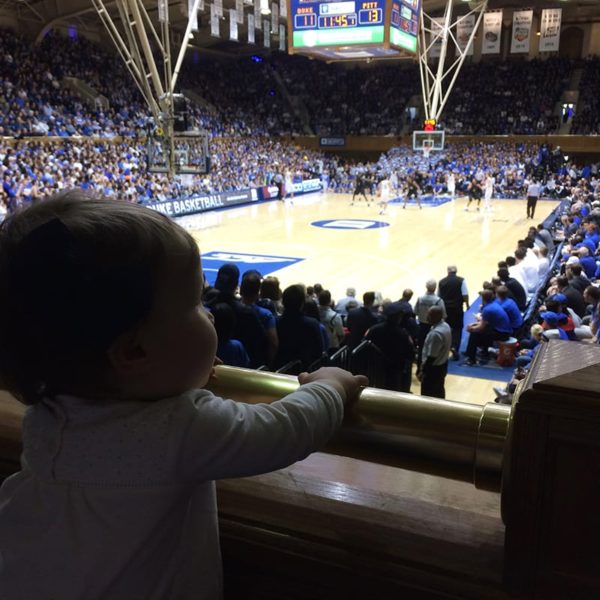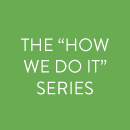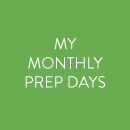Why we love participating in research studies
Here’s a funny little post for you! Beginning when June was about 9 months old, we’ve participated in research studies at our local universities several times a year. When I mention this to friends, I’m often met with both interest and confusion, so I thought I’d share a bit about it today! Let’s do a little Q&A…

No photos of the studies, so here’s baby June at her first Duke game!
What do you mean by research studies? We happen to live by three major research universities (UNC, Duke, and NC State) and all have thriving research labs with ongoing studies that need an ongoing stream of participants. The studies we’ve participated in have focused on infant and child development – things like social and emotional development and language acquisition.
What is it like to participate? In our experience, it has involved a child and parent pair visiting a research lab and completing a cognitive or behavioral assessment. The labs are very family-friendly (waiting rooms with lots of toys!) and the students have also been very friendly (and grateful for our participation). The whole experience usually takes about half an hour.
We start by filling out some demographic paperwork before moving onto the study itself, which usually takes no longer than 15 minutes. As an example, the latest study June participated in was investigating how young children understand and use the word “we,” so she was shown various groups of kids on a screen and asked questions about them. In the COVID era, we’ve even participated in studies via Zoom!
What else do I need to know? Most labs are looking for kids ages 6 months to 18 years, though individual studies will have narrower required age ranges. In our experience, the scheduling has been very flexible – they usually have slots from 9-6 or so, including Saturdays. We’ve been paid either a small gas allowance or something like a $10 Amazon gift card as a thank you, and the kids have gotten a “junior scientist” certificate and their choice of a small prize. June has always found it to be fun!
How can I participate? Shortly after our kids were born, we received information in the mail about joining the research registries of UNC and Duke, which is how we first got connected. Most of our studies have been through the Duke Child Studies Lab, so if you’re in the Triangle, you can learn more and sign up here! Otherwise, I’d Google the name of your nearest university and “child studies” or “research studies” and see what you can find!
Why bother? Great question! Research studies first came on my radar years ago when a dear friend, working in a research lab as a Yale graduate student, connected with my mom (a preschool director), to recruit kiddos for her lab’s studies. I remember her saying how tough it was to find people to participate, and thought it was neat that they could work together. When I heard about similar studies in our area, I remembered that conversation and liked the idea of being able to help.
In a larger sense, y’all know I love my parenting books – and my favorite ones are chock full of anecdotes and findings from studies just like the ones we’ve participated in. Our individual 15-minute bit might seem small in the grand scheme of things, but it’s part of building a better understanding of behavior and development. Just like democracy, it turns out we all have a role to play in the scientific process! :)
Also, though my kids have only a limited understanding of what they’re doing at the moment, I think these visits will be a neat vehicle to talk to them about research, science, college, our brains, careers, etc. as they get older.
I’d love to hear: have you ever participated in a research study? As the researcher or participant, by yourself or with your child? Have I inspired you to look into options in your area? :)




















Thank you so much for sharing your perspective. It’s great to think about the future impact of participation in a study. My daughter has participated in a memory study since starting Kindergarten. She loves the games she gets to play as part of the study and the researchers she gets to meet are so wonderful. Plus, she’s earned books and her very own Target gift cards that she uses to buy herself LEGOs. It’s been a positive experience for everyone.
That is such a sweet idea to hand over the Target gift card, Amanda! Would love to try that with June if we ever get a physical gift card!
I loved reading this! I majored in Biology in college and my fiancé majored in Psychology and is now in medical school, so we love studies and science over here! :) I participated in research studies throughout college and continued to when living in D.C. after graduating, but admittedly haven’t sought out the opportunity since moving to Philadelphia. This is a great reminder to get back into it!
I’ve never done one myself – I should look into it, too!
Love this idea!
When I was 16 years old and first diagnosed with kidney disease I participated in a genetic study about African Americans and the disease. Since I live near DC we went to NIH. It’s pretty fascinating reading about the results of the study now and all the progress they’ve made in treating kidney disease since I took part. Turns out people who have a certain gene are 7 times more likely to have kidney failure, which I did, twice. It’s not great news haha but having this information, knowing I have the gene variant, has made me a stronger advocate in my health care, which I’m a big proponent of. And one of my sisters even decided to get a genetic test to determine if she had the same risk allele (she doesn’t!).
As much as I love participating in the development and behavioral studies, the medical ones are a whole other level! So glad you got some helpful answers out of it!
When I was in undergrad, psychology courses required you to participate in at least one research study. I took part in three different studies over the course of my degree to earn my science credits. I was fascinated by how the different teams of researchers were planning to use the data!
So smart to require you to understand the work from the other side!
As someone who worked in clinical research for many years, I am standing and applauding this post. Also, how did I not know this? Fun fact, my two tiny people are signed up for the mid-atlantic twin registry. But I am going to try to get us registered more locally too. Thanks for the info!
Loved reading this unique & informative post! Yay science!
Love this! As a graduate student I remember it being so difficult to find people to participate. So I’m always happy to complete someone’s survey or help out in any way I can. Besides, the little incentives are nice too smile. ????
I was diagnosed with systemic lupus when I was 10 years old, and was being treated at Cincinnati Children’s Hospital for the first ~8 years of my treatment, and participated in a lot of studies, both medical and behavioral! I loved them because I almost always got a gift card, and the medical ones mostly required just a few vials of blood, which I was already giving as part of my regular appointment. I would have the whole day off school to travel and do my appointment, so hanging out for a bit to do a behavioral study wasn’t an inconvenience at all. I think as a child it helped me start to understand science a bit better, and helped me see how it felt to participate in something bigger than myself.
How fun! I am not shocked in the least to hear this is a Thomas family value. If we ever make it to NC I am inspired to also sign up the Bosse boys. I love the connection you made between actually attending the study portion and future conversations with your children. Very intentional, friend.
Yesss this is something that both of my kiddos have participated in! Our favorite one was through the Marcus Autism center here in Atlanta that collaborates with Emory University. My daughter is neurotypical but they did a full autism screening as part of the study when she was 2 years old. It was SO fascinating to watch and to have a full debrief discussion with the researchers afterward.
I love that you’re using your voice to speak about this experience and maybe open it up to someone who wasn’t aware of these projects or was unsure.
I participated in some studies in college for a little extra spending money (and sometimes free meals, ha!) The only one I can remember is the impact of gum chewing on appetite and I had to carry a palm pilot around (early 2000’s) and check in periodically with my hunger levels. I had a (poor) grad student friend at church who did some very intense ones, one involved eating premade meals and wearing a paper suit under her clothes to see what nutrients came out in sweat. She made a lot of money for that one! I checked my small local university and they don’t have anything offered, but I’ll keep my eyes out! Thanks for the idea!
What a creative idea for a blog post! Like another commenter mentioned, I had to participate in several research studies for my undergrad psych and sociology classes. I always enjoyed them! In a somewhat similar vein, my first reporting job involved continuing the newspaper’s Class of 2022 project. The previous education reporter started a series following a group of kids from kindergarten to their senior year of high school. I came on the scene when the kids were in second grade and reported several stories about them for the next three years. These were never as scientific as real research studies – I wrote about things like how each family handled rewards for good grades! – but it was so interesting to see the differences among the kids.
I participated in a bunch of research studies while I was in grad school to earn extra cash. Some of them were a little more involved, but those paid nicely (I think for one them I got $60-75 for 2 hours of my time). I’m ALL FOR IT. Haha.
As the director of the above mentioned preschool, I was always interested in trying to figure out what they were really trying to measure :) They give you some info, but my understanding is they don’t give you all of it so as not to skew the study!